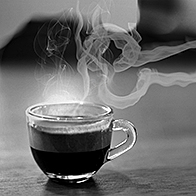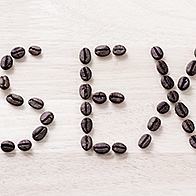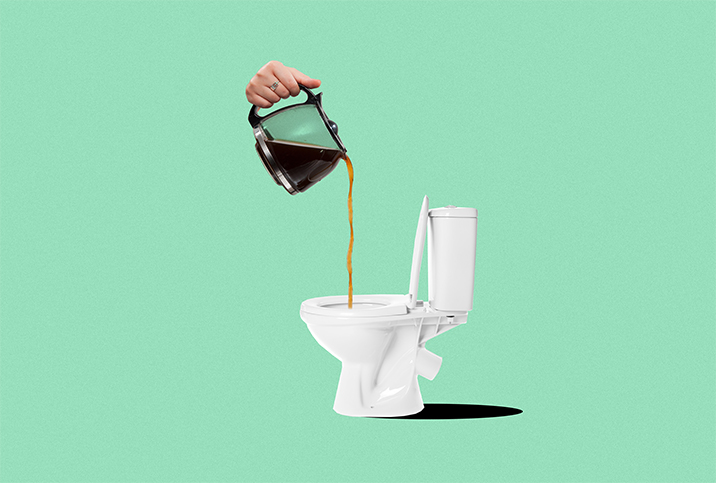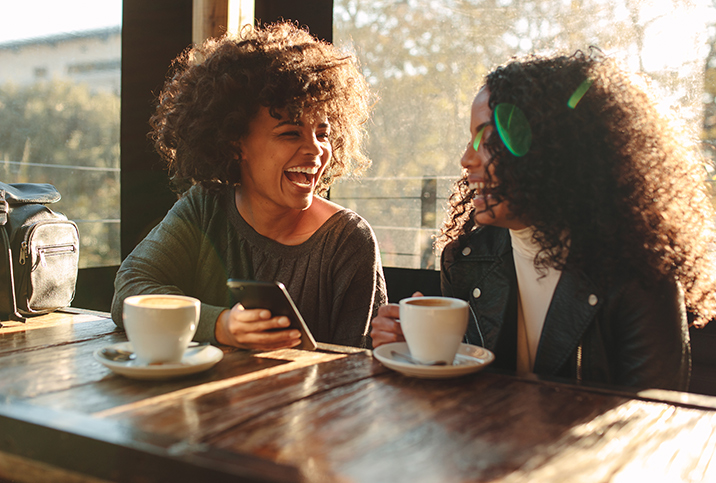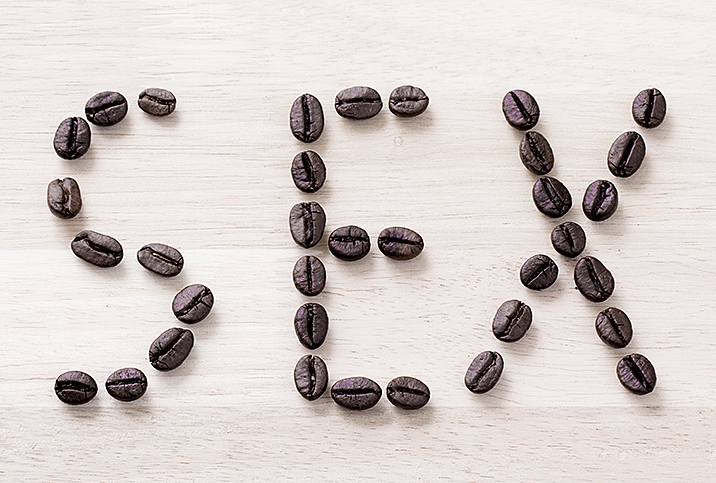Coffee and Sex: What Are the Effects of Caffeine on Libido?
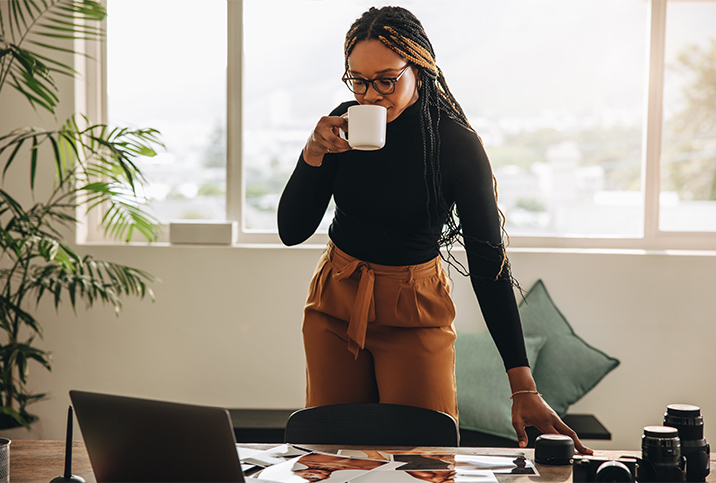
Nothing hits quite like the first sip of coffee after waking up. Whether brewed by your local mermaid or your everyday machine in the kitchen, coffee is a staple in most U.S. households. About 90 percent of Americans consume caffeine daily in some form, including energy drinks and soda, but 62 percent get their fix every day from drinking coffee, according to 2020 statistics. We're also drinking more coffee, up 5 percent since 2015.
A lot of people report that they can't face the day without a morning cup of coffee, but if your body is crying out for something, is that a clue to caffeine's addictive qualities?
The research on coffee and sex
Some people consider coffee a natural aphrodisiac that boosts your sex life because it seems to give us energy, revitalizing our brains and boosting physical prowess. You can mark that down to the presence of caffeine, a natural stimulant also found in chocolate, cocoa and tea, and an added ingredient to some sodas and sports drinks.
When caffeine is absorbed into the bloodstream, it blocks the effects of adenosine—a chemical in the cells that helps keep the heartbeat at a regular rhythm—slowing down the neural activity that makes you feel lethargic. Caffeine increases the levels of adrenaline in your blood and promotes the release of dopamine, which plays a role in how you feel pleasure, and norepinephrine, which increases your heart rate. The combination of these two neurotransmitters in the brain improves your arousal, level of response and energy.
Coffee is a rich source of anti-inflammatory agents and antioxidants that can improve brain health. The beverage contains polyphenols, which raise testosterone levels that in turn increase blood flow and relax the arteries and smooth muscle of the penis; this can result in firmer erections and an improved sex life.
There is research about the effects of coffee and enhanced sexual performance, but the results are a mixed bag.
The most quoted research, published in 2015, was carried out at the University of Texas Health Science Center in Houston. Based on tests conducted on 3,700 men from 2002 to 2004, results indicated that men who drank two to three cups of coffee each day had a slightly lower incidence of erectile dysfunction (ED) than men who abstained from coffee. However, the lead researcher, David Lopez, led a study in 2017 including more than 20,000 men that showed no link at all between drinking caffeinated coffee and ED.
To confuse the issue even more, the later study indicated that drinking four or more cups of decaffeinated coffee per day increased the risk of ED by 37 percent.
There's better news on the cardiovascular front. Researchers studying more than 25,000 men and women in Korea with an average age of 41 indicated that coffee may be good for the heart. One of the authors explained, "Our study adds to a growing body of evidence suggesting that coffee consumption might be inversely associated with cardiovascular disease risk."
Finally, a research study carried out in 2005 at Southwestern University in Georgetown, Texas, on 108 female rats suggested that a moderate dose of caffeine increased their libido.
Caffeine and hormone levels
Hormones are always the first suspects to take the blame for belly fat, but what about caffeine from daily coffee? According to the National Institutes of Health (NIH), caffeine may cause the body to make too much cortisol. Cortisol is also known as the stress hormone and having too much may lead to weight gain, especially around the midsection.
Another study from the NIH indicated that too much caffeine from drinks like tea and coffee, especially espresso, is linked to estrogen imbalances, particularly in Asian women. The study involved women of child-bearing age; the changes in estrogen levels did not appear to affect ovulation.
"Some health experts say coffee can wreak havoc on our health and hormones, while other health experts tout its benefits," said Brett Sorel, M.S., R.D.N., an integrative dietitian, holistic teacher and mindset coach in Fort Lauderdale, Florida. "As with most things, I believe it comes down to bio-individuality. We are all so different, and what is healthy for one person is not necessarily healthy for another. Some individuals are sensitive to caffeine and cannot tolerate any amount, while others can enjoy the health benefits of coffee as part of their morning ritual or as a little pick-me-up."
However, she did warn that coffee can potentially "tax the adrenal glands and stress your digestive and cardiovascular system, although studies have shown that it's associated with a reduced risk of type 2 diabetes and can have neuroprotective effects due to its antioxidant content."
How much caffeine is too much?
Caffeine itself is relatively safe. Certain health conditions—such as a temporary increase in blood pressure—can be affected by any amount of caffeine.
An 8-ounce cup of regular coffee contains about 95 to 160 milligrams (mg) of caffeine. A single shot of espresso—created by forcing high-pressure hot water through finely ground coffee—contains around 90 mg of caffeine.
Consuming up to 400 mg of caffeine a day is safe for most adults, according to Mayo Clinic. This amount is equivalent to about two to three cups of brewed coffee, four espresso shots, 10 cans of soda or two energy drinks. However, there's no reason to run out and ramp up to a daily 400-mg threshold, as this level is the absolute maximum you'd want to consume in a single day.
Tolerance to coffee typically varies by age and from person to person based on their physical and mental makeup. Research tells us you can become mildly dependent on coffee if you drink two to four cups every day.
Consuming up to 400 mg of caffeine a day is safe for most adults.
"People can become addicted to coffee/espresso, and I believe it's too much when you become dependent on it," Sorel said. "You're having too much if you experience any negative effects when you don't have it."
Signs that you're drinking too much coffee include anxiety, headaches, heart palpitations, jitters and sleep disruptions. Although the good news is that any dependence can be halted by not drinking coffee for seven to 12 days, you may experience many of the same adverse symptoms while you break the addiction.
"I recommend gradually decreasing coffee consumption or caffeinated beverages," Sorel advised. "You can start with half-caffeinated, half-decaf and then swap to green tea, which has caffeine but in gentler volumes. "
Coffee lovers, rejoice!
Coffee is the most consumed psychoactive substance in the world, and more people are discovering its powers every day. If you drink no more than a couple of cups per day, then it can elevate your mood and increase your energy levels, cognitive powers and memory.
However, it affects everyone differently, and caution is advised as you figure out how your body reacts to coffee consumption. If you experience something you weren't expecting, make sure you speak to your healthcare provider.
When choosing a coffee at the grocery store or coffee shop, coffee snobs may be getting the best health benefits.
"When it comes to coffee, the quality and how you drink it are the most important factors," Sorel said. "I recommend choosing organic and consuming it alongside a meal with protein and fat to slow down the speed at which it's metabolized. I love to add collagen peptides and coconut milk creamer for protein and healthy fat. For an extra antioxidant and immune boost, you can add adaptogenic mushrooms."







